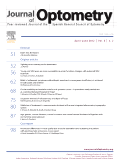
Journal of Optometry
Scope & Guideline
Advancing vision science for a brighter future.
Introduction
Aims and Scopes
- Refractive Errors and Myopia Management:
The journal frequently publishes studies on the prevalence, causes, and management strategies for refractive errors, particularly myopia, in different populations, highlighting the need for effective interventions. - Clinical Assessment and Diagnosis:
Research articles often focus on the methodologies used for assessing visual acuity, ocular motility, and binocular vision, contributing to improved clinical practices and diagnostic accuracy. - Ocular Health and Disease:
The journal covers a wide array of topics related to ocular diseases, including dry eye syndrome, keratoconus, and the impact of systemic conditions on eye health, promoting a holistic approach to patient care. - Technological Advances in Optometry:
There is significant emphasis on new technologies in optometry, including optical coherence tomography and artificial intelligence applications, which are reshaping diagnostic and treatment methodologies. - Vision Therapy and Rehabilitation:
Research on vision therapy techniques and their effectiveness is a recurring theme, focusing on improving visual function in patients with amblyopia, strabismus, and other conditions. - Public Health and Societal Impact:
Papers often explore the relationship between ocular health and socioeconomic factors, emphasizing the public health implications of visual impairment and the importance of accessibility to eye care.
Trending and Emerging
- Artificial Intelligence and Machine Learning:
There is a growing trend in the use of AI and machine learning technologies for diagnostics and treatment planning in optometry, showcasing the journal's commitment to integrating cutting-edge technology into clinical practice. - Impact of Digital Devices on Visual Health:
Research examining the effects of prolonged use of digital devices on visual function and the prevalence of conditions like computer vision syndrome is on the rise, reflecting societal changes in technology usage. - Personalized and Evidence-Based Vision Therapy:
There is a notable increase in studies exploring personalized approaches to vision therapy, focusing on individualized treatment plans based on specific patient needs and conditions. - Public Health Implications of Vision Care:
Emerging studies emphasize the public health aspects of optometry, particularly the impact of socioeconomic factors on visual health and access to care, which is becoming a vital area of research. - Innovative Treatment Modalities:
Research into new treatment modalities, including pharmacological interventions and advanced surgical techniques, is gaining prominence, reflecting the journal's focus on advancing clinical practice.
Declining or Waning
- Traditional Vision Correction Methods:
There is a noticeable decline in studies focusing solely on traditional methods of vision correction, such as glasses and basic contact lenses, as newer technologies and methods gain traction. - Basic Visual Acuity Testing:
Research centered around simple visual acuity tests is becoming less frequent, possibly due to the growing interest in more comprehensive assessments of visual function and ocular health. - Basic Epidemiological Studies:
While epidemiological research remains important, there is a shift away from basic prevalence studies towards more complex, multifactorial analyses that explore the interplay of various factors affecting ocular health. - Generalized Ocular Health Studies:
Research that does not delve into specific conditions or does not utilize advanced diagnostic tools is less common, as the journal increasingly prioritizes studies with clear clinical implications or innovative approaches.
Similar Journals

African Vision and Eye Health Journal
Championing eye health advancements for all Africans.African Vision and Eye Health Journal is an esteemed publication dedicated to advancing the fields of ophthalmology, optometry, and public health across the African continent. Published by AOSIS, this journal serves as a vital platform for disseminating research, clinical practices, and educational advancements aimed at improving eye health and vision care. As an Open Access journal, it ensures that knowledge is freely accessible to researchers, healthcare professionals, and practitioners, fostering collaboration and innovation. With its ISSN 0378-9411 and E-ISSN 2410-3039, the journal is committed to enhancing the understanding of vision-related issues affecting diverse populations, making it an invaluable resource for those dedicated to the promotion of eye health in Africa. By providing cutting-edge research and insights, the African Vision and Eye Health Journal plays a critical role in addressing the challenges of eye health and is a key resource for anyone committed to making a difference in this essential field.
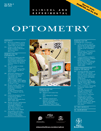
Clinical and Experimental Optometry
Exploring the forefront of optometry and ophthalmology.Clinical and Experimental Optometry, published by Taylor & Francis Ltd, is a distinguished journal dedicated to advancing the field of optometry and ophthalmology. With an impressive scope covering both clinical practices and experimental research, this journal serves as a vital resource for researchers, healthcare professionals, and students alike. Recognized in the Q2 category for Ophthalmology and Q1 category for Optometry in 2023, it underscores its significance in fostering innovative research and clinical knowledge. The journal has been in publication since 1986 and continues to accept contributions up until 2024, reflecting its ongoing commitment to disseminating high-quality scholarly work. With a Scopus ranking of 40 in Ophthalmology and 5 in Health Professions - Optometry, it is positioned among the leading journals in the field. Although not an open-access journal, it remains integral for anyone invested in the latest trends and findings in vision science, making it an essential part of the academic landscape in the UK and beyond.
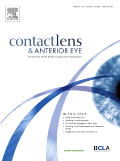
Contact Lens & Anterior Eye
Elevating Knowledge in Optometry and OphthalmologyContact Lens & Anterior Eye is a premier journal dedicated to advancing the field of optometry, ophthalmology, and overall visual health. Published by Elsevier, this journal boasts an impressive impact factor and is indexed with both ISSN 1367-0484 and E-ISSN 1476-5411. It stands out with a Q1 ranking in the categories of Medicine (miscellaneous), Ophthalmology, and Optometry, placing it at the forefront of scholarly research in its disciplines. With a comprehensive scope that encompasses the latest advancements in contact lens technology and anterior eye health, the journal serves as a crucial resource for researchers, healthcare professionals, and students aiming to enhance their knowledge and skills. The journal has been publishing cutting-edge research since its inception in 1997 and continues to pave the way in ophthalmic research through high-quality, peer-reviewed articles. Although it does not currently offer Open Access options, its availability through institutional subscriptions ensures that critical research reaches its intended audience effectively.
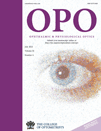
OPHTHALMIC AND PHYSIOLOGICAL OPTICS
Exploring the intricate connections of sight and physiology.Ophthalmic and Physiological Optics, published by Wiley, is a premier peer-reviewed journal dedicated to advancing the fields of ophthalmology, optometry, and sensory systems. With an impressive impact factor and categorized in the prestigious Q1 quartile for 2023 across multiple disciplines, the journal provides a vital platform for researchers and practitioners to disseminate innovative findings and explore the complexities of visual science. Founded in 1981, it continues to thrive as a leading resource for reviewing contemporary issues, emerging technologies, and clinical practices. Readers will benefit from its rigorous editorial standards and access to groundbreaking studies pertinent to both academic and clinical environments. Situated at the forefront of the discipline, Ophthalmic and Physiological Optics plays an essential role in bridging the gap between research and practical application, ensuring a comprehensive understanding of vision and its physiological underpinnings.
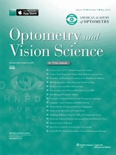
OPTOMETRY AND VISION SCIENCE
Elevating Optometry with Groundbreaking InsightsOptometry and Vision Science is a premier journal published by Lippincott Williams & Wilkins, dedicated to advancing the field of optometry and ophthalmology. With a rich history dating back to 1905 and a strong emphasis on scientific rigor, the journal has established itself as a vital resource for researchers, professionals, and students alike. Currently ranked in the Q2 category for both Ophthalmology and Optometry, it occupies a significant position in the academic community, as evidenced by its Scopus rankings of #61 among 137 in Medicine - Ophthalmology and #6 among 12 in Health Professions - Optometry. The journal publishes original research, clinical studies, and critical reviews that contribute to the understanding of visual science, the development of innovative practices, and the enhancement of patient care. Although it is not open access, its impactful content is available to subscribers and institutions, fostering a deeper insight into the complexities of vision science. As we approach the journal's centennial milestone in 2024, Optometry and Vision Science continues to reflect the evolving landscape of eye care research and is poised to inspire a new generation of vision scientists.
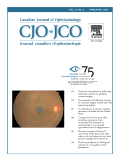
CANADIAN JOURNAL OF OPHTHALMOLOGY-JOURNAL CANADIEN D OPHTALMOLOGIE
Fostering innovation in eye care research.Canadian Journal of Ophthalmology - Journal Canadien d'Ophtalmologie, published by the prestigious Canadian Ophthalmological Society, serves as a leading platform for disseminating cutting-edge research in the field of ophthalmology. With an ISSN of 0008-4182 and E-ISSN 1715-3360, the journal boasts a commendable impact factor and maintains a strong presence within the medicine and ophthalmology categories, ranking in the Q2 quartile. This journal not only provides significant insights into clinical practices and advancements but also contributes to the understanding of ocular health issues facing contemporary society. Since its inception in 1966, it has published high-quality research, making substantial strides in both practical and theoretical aspects of ophthalmology until 2024. Although it is not an open-access journal, it establishes a vital resource for researchers, professionals, and students alike, fostering an informed community dedicated to improving vision care.

Translational Vision Science & Technology
Advancing the Frontiers of Vision Science and TechnologyTranslational Vision Science & Technology is a premier open access journal dedicated to the advancement of the field of ophthalmology and biomedical engineering. Published by the Association for Research in Vision and Ophthalmology, Inc., this journal has established itself as a leading source of high-quality research since its inception in 2013, achieving a remarkable impact factor reflective of its influential contribution to the field. With an impressive ranking of #21 in Ophthalmology and #120 in Biomedical Engineering within the Scopus database, it sits within the prestigious Q1 quartile for both categories as of 2023, further validating its significance. The journal's scope encompasses a wide variety of topics focused on the intersection of ophthalmological science and technological innovation, welcoming contributions that promote the understanding and treatment of visual disorders. Available as an Open Access publication since 2016, it ensures that cutting-edge research is freely accessible to researchers, practitioners, and students worldwide, facilitating the rapid dissemination of knowledge essential for the advancement of vision science.

EUROPEAN JOURNAL OF OPHTHALMOLOGY
Pioneering Insights into Ocular DiseasesThe EUROPEAN JOURNAL OF OPHTHALMOLOGY, published by SAGE PUBLICATIONS LTD, is a leading international journal in the field of ophthalmology, dedicated to advancing the understanding and treatment of ocular diseases and disorders. With an ISSN of 1120-6721 and an E-ISSN of 1724-6016, the journal aims to provide a platform for innovative research, critical reviews, and comprehensive studies that span the diverse aspects of the discipline. As part of its commitment to disseminating high-quality research, the journal is indexed in Scopus, achieving an impressive rank of #47 out of 137 in the Medicine - Ophthalmology category, indicating its strong impact within the academic community. With a current impact factor that places it in the Q2 quartile for both Medicine (miscellaneous) and Ophthalmology as of 2023, it offers researchers and practitioners access to important findings and developments in eye health. The journal's converged years from 1991 to 2024 exemplify its longstanding commitment to the field, making it an essential resource for anyone looking to stay at the forefront of ophthalmological research.

MOLECULAR VISION
Exploring groundbreaking discoveries in ophthalmology.MOLECULAR VISION is a premier open-access journal that has been advancing the field of ophthalmology since its inception in 1995. Published by MOLECULAR VISION, this journal boasts a strong reputation, currently ranking in the second quartile (Q2) of its category, with a Scopus ranking of 35 out of 137, placing it in the 74th percentile among peer publications. Dedicated to disseminating groundbreaking research and innovative findings in the study of vision and ocular health, MOLECULAR VISION serves as a vital resource for researchers, healthcare professionals, and students engaged in this dynamic field. The journal welcomes contributions spanning fundamental and clinical research, offering a platform for crucial knowledge exchange that is essential for advancing ocular health and function. With its commitment to open access, readers around the globe can freely access and build upon the wealth of information disseminated through its pages, ensuring that the latest developments in ophthalmology are available to all.

Clinical Optometry
Enhancing Understanding through Pioneering Research.Clinical Optometry is a prominent open-access journal published by DOVE MEDICAL PRESS LTD, dedicated to advancing the field of ophthalmology and sensory systems. Established in 2010, this journal provides a platform for impactful research and insights that facilitate the understanding and treatment of visual disorders. With an impressive Scopus ranking of #58 in Ophthalmology and #28 in Neuroscience & Sensory Systems, Clinical Optometry is recognized for its contributions to the academic community, correlating with a Q3 classification in Ophthalmology and Q4 in Sensory Systems as of 2023. Based in New Zealand, this journal encourages researchers, professionals, and students to disseminate their findings, fostering a culture of knowledge sharing and collaboration in the field. For those interested in cutting-edge research, Clinical Optometry serves as an essential resource, offering a comprehensive collection of articles that enhance the understanding of ophthalmologic science.